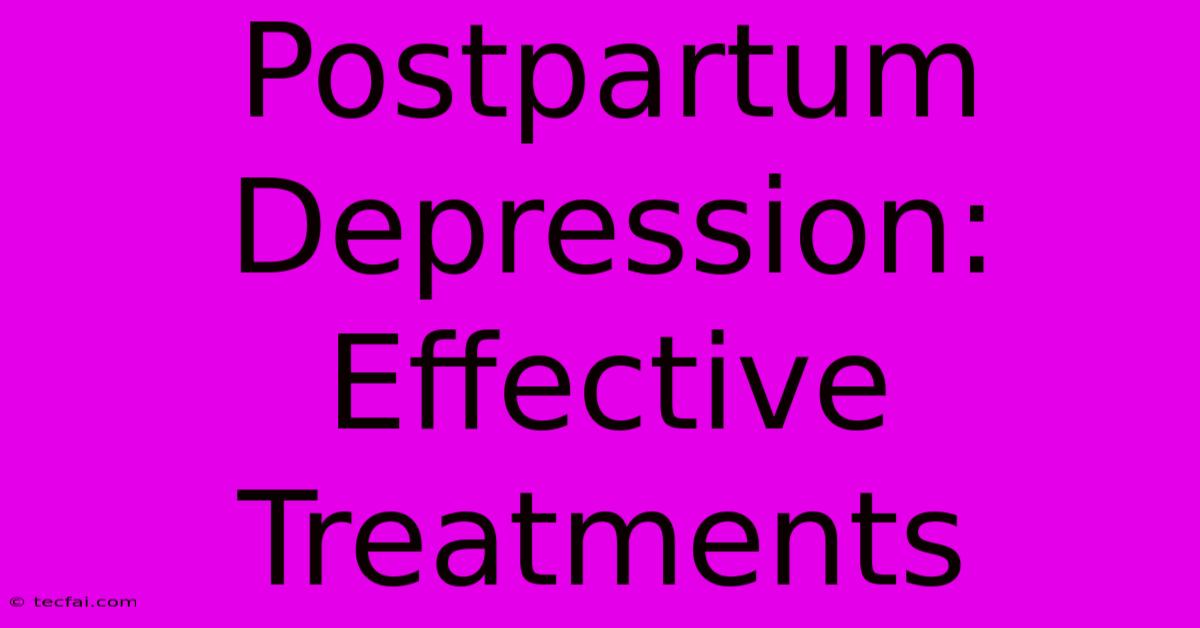Postpartum Depression: Effective Treatments

Discover more detailed and exciting information on our website. Click the link below to start your adventure: Visit Best Website tecfai.com. Don't miss out!
Table of Contents
Postpartum Depression: Effective Treatments
Postpartum depression (PPD) is a serious condition affecting many new mothers. It's crucial to understand that experiencing sadness or anxiety after childbirth is common, but PPD is more intense and persistent, significantly impacting daily life. This article explores effective treatments for postpartum depression, empowering you to seek help and find relief.
Understanding Postpartum Depression
Before diving into treatments, it's essential to recognize the symptoms of PPD. While they can vary, common signs include:
- Persistent sadness or low mood: This goes beyond the "baby blues," lasting for weeks or even months.
- Loss of interest or pleasure: Activities once enjoyed now feel burdensome or unappealing.
- Changes in appetite or sleep: Significant weight loss or gain, insomnia, or excessive sleeping.
- Fatigue and low energy: Feeling constantly drained and unable to cope with daily tasks.
- Feelings of worthlessness or guilt: Excessive self-criticism and feelings of inadequacy.
- Difficulty concentrating or making decisions: Struggling with simple tasks and cognitive function.
- Thoughts of self-harm or harming the baby: This is a serious symptom requiring immediate professional help.
If you're experiencing several of these symptoms, it's vital to seek professional help. Don't hesitate; reaching out is a sign of strength, not weakness.
Effective Treatments for Postpartum Depression
Fortunately, effective treatments are available for PPD. These treatments often involve a combination of approaches, tailored to individual needs.
1. Psychotherapy
- Cognitive Behavioral Therapy (CBT): CBT helps identify and challenge negative thought patterns and behaviors contributing to depression. It teaches coping mechanisms to manage symptoms and improve overall well-being.
- Interpersonal Therapy (IPT): IPT focuses on improving relationships and communication skills, addressing interpersonal issues that may be exacerbating depression.
These therapies are often conducted individually or in group settings, providing support and a safe space to discuss experiences.
2. Medication
- Antidepressants: Doctors may prescribe antidepressants, such as selective serotonin reuptake inhibitors (SSRIs), to help regulate brain chemistry and alleviate depressive symptoms. It's crucial to discuss potential side effects and interactions with your doctor. Note: Many antidepressants are considered safe for breastfeeding mothers, but it’s essential to have an open discussion with your physician.
Medication is often used in conjunction with psychotherapy for a more comprehensive approach.
3. Lifestyle Changes
While not a standalone treatment, lifestyle modifications can significantly support recovery from PPD:
- Healthy Diet: Nourishing your body with a balanced diet provides essential nutrients for both physical and mental health.
- Regular Exercise: Physical activity releases endorphins, improving mood and reducing stress. Even short walks can make a difference.
- Sufficient Sleep: Prioritizing sleep, even in small increments, can improve overall well-being.
- Support Systems: Leaning on family, friends, or support groups provides crucial emotional support and reduces feelings of isolation.
4. Alternative Therapies
Some women find relief through alternative therapies, though these should always be used in conjunction with, and not instead of, professional medical advice:
- Mindfulness and Meditation: Practicing mindfulness can help manage stress and improve emotional regulation.
- Yoga and Acupuncture: These practices can help reduce stress and promote relaxation.
Seeking Help and Support
The most important step in managing PPD is seeking professional help. Don't be afraid to reach out to your doctor, a therapist, or a support group. There are resources available to help you navigate this challenging time.
Remember: Postpartum depression is treatable. With the right support and treatment, you can recover and enjoy the precious moments of motherhood. Your well-being is crucial for both you and your baby. Don't hesitate to reach out for help – you are not alone.

Thank you for visiting our website wich cover about Postpartum Depression: Effective Treatments. We hope the information provided has been useful to you. Feel free to contact us if you have any questions or need further assistance. See you next time and dont miss to bookmark.
Featured Posts
-
Serena Motherhoods Life Lessons
Dec 03, 2024
-
Morins Big Announcement On Tlmep
Dec 03, 2024
-
Live Racing Ffos Las Plumpton Wolverhampton
Dec 03, 2024
-
Lungkot Ni V Pumanaw Na Si Yeontan
Dec 03, 2024
-
Snowdens Triple Threat At Wolverhampton
Dec 03, 2024
